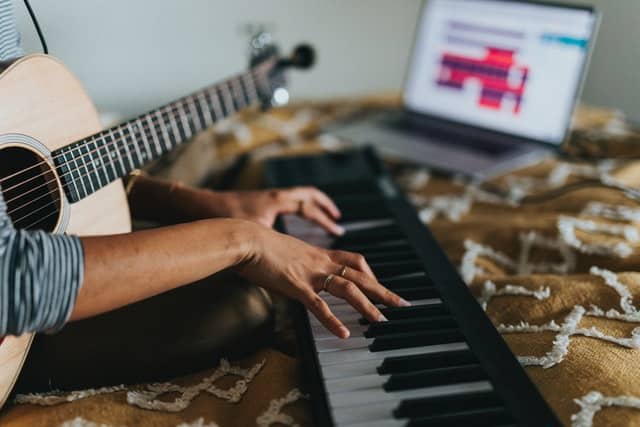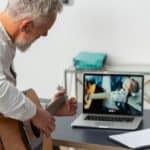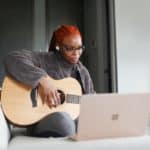The piano is one of the fundamental instruments of modern music.
Although it is not present in its original form in most of today’s hits, keyboards are still used in music production as the standard way of inputting musical ideas into a computer.
This is not something casual, however.
Piano keyboards are a great way of visualizing music notes and scales, and even a greater tool for performing.
The ability to be your own rhythm section is not something that many other instruments offer.
But apart from its clear advantages as a tool for music, a question many guitarists ask themselves is what motivates this article:
Will learning piano improve your ability as a guitar player?
Although piano technique is very different from guitar, learning piano will surely heighten your overall musical skills, giving you a better grasp on harmony, melody, comping, and even rhythm. However, taking piano lessons as a guitar beginner will only make your specific guitar progress slower.
In this article, I will go in-depth about everything related to playing the piano as a guitarist. What are the things about it that could improve your musicianship, and what are skills exclusive to that instrument.
After leaving this page, you will have a clear idea about if learning the piano is a good idea for you, at the current stage of your guitar journey.
Are you ready to get started?
Let’s go!
Do piano skills translate into guitar skills?
Let’s lay down the obvious: Guitar and piano are played in a completely different way.
I can’t think of any part of the technique of each of these instruments that could be easily translated to the other.
However, music skills are universal.
Playing piano will inevitably heighten your musical sense, making you work on your rhythm, coordination, and theory.
Even for many non-classically trained guitarists starting piano lessons will be the first approach to traditional music notation.
It’s time you grow up and leave the tabs aside for a while.
Piano is also a great tool for visualizing notes and scale since they are all laid out in front of you in an orderly manner.
Sometimes when we play guitar, we might not be fully conscious of the actual note we are playing, but on the piano, things are more obvious at first glance.
Ultimately, what I’m trying to say here is that piano skills and guitar skills at some level are just musical skills, and a great musician will be a great musician regardless of which instrument he is currently playing.
Of course, you could feel more comfortable with one instrument over the other, but the way you think and hear music will be the same, no matter the constraints.
Can playing piano make you a better guitar player?
Playing piano will not make you a better guitar player directly.
However, it will likely make a better or more complete musician.
It will all depend on which stage of your guitar journey you are currently at. More on this later.
What learning piano can bring to the table is just another way of approaching or visualizing music.
Since music theory is the same for every instrument, getting to interpret it from different perspectives can only expand your global view of it.
Also, learning the ins and outs of the piano will teach you how to think as if you weren’t a guitarist since some common ways of approaching rhythm or harmony on the guitar are not that usual on other instruments.
Is it worth it to learn piano to improve as a guitar player?
Taking piano lessons with the only goal to boost your guitar playing is not a great idea.
You will be sinking down a lot of time dedicated to learning the basics of this new instrument, and getting some muscle memory down until you can start playing your first pieces.
I think, again, with the said goal of becoming better at guitar, you will be way better off dedicating that time to working exclusively on your guitar playing.
Setting up a serious practice routine and finding players to jam with could be a way more enriching activity for you as a guitar player than learning the basics of piano.
However, if you are already a seasoned guitarist, and you are at an intermediate to advanced level, taking some piano lessons can only benefit you, in my opinion.
When the trade-off about learning the basics of one instrument against the other is still there, the clear decision should be to stick with the guitar, however, when you already have all the basics down, and a bit more than that, taking on the piano will help you broaden your toolset as a musician, as I mentioned earlier.
Piano is great for composing music
What many players find out with time, is that piano is probably the ultimate instrument for composing.
First of all, the piano allows you to work on harmony and melody at the same time, instantly by playing it with both hands.
Secondly, as I said earlier, the modern way of inputting music ideas into software is through midi controllers that, in most cases, present to you with a set of piano keys.
Getting the basics of keyboard technique down will only open you doors into the music composition sphere.
Any harmony or melody you create on a piano will be easily translatable to every other instrument.
Finally, to many players, piano is great for visualizing chords and scales. Name the alterations and all the information is just there in front of you.
Are there any other instruments to learn to improve on guitar?
Keeping my recommendation of not distracting from guitar until you reach an intermediate to advanced level, if your end goal is being a great guitar player, I will say that there are virtues at that point from learning just about any other instrument.
Lead instruments such as the sax, flute, trombone, etc. will be great for your soloing and coming up with catchy musical ideas.
Rhythm instruments such as bass and drums will improve your locking down with the metronome while giving you a different perspective on music performance.
Any stringed instrument without frets will push you to work on your muscle memory and relative ear.
And the list goes on and on. Every instrument you can think of will add something to your musical arsenal that can be somehow translated to guitar.
However, and for the hundredth time, it is not a great idea to spend a few weeks with every different instrument on the planet while neglecting the guitar.
Be strategic and effective with your guitar learning.

Hello there, my name is Ramiro and I’ve been playing guitar for almost 20 years. I’m obsessed with everything gear-related and I thought it might be worth sharing it. From guitars, pedals, amps, and synths to studio gear and production tips, I hope you find what I post here useful, and I’ll try my best to keep it entertaining also.





